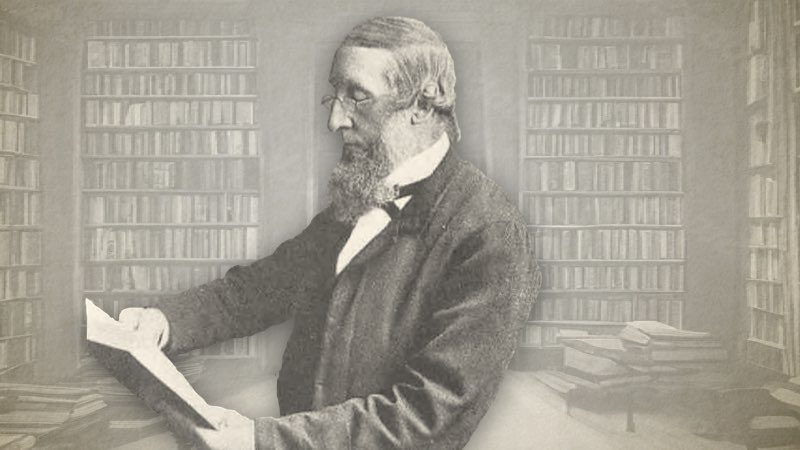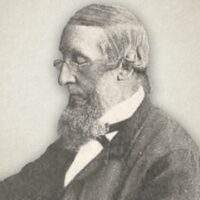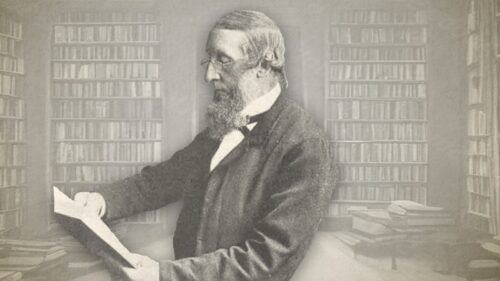
Exhortation To Humility
A Sermon Preached By Grey Hazlerigg, At Forest Hill in May, 1882
If you look through the chapter from which I have taken my text, you will find it full of the preceptive part of God’s Word. Some people have such a dislike for the preceptive part; if a minister speaks of it, they call him legal directly, but why is it? Because they are not willing to walk in obedience to the Gospel precepts. How full all the epistles are of the preceptive part; and if a minister does not preach this part (though it may be termed nothing but legality), he will not be able to stand before God and say, “I have not shunned to declare the whole counsel of God.”
We will just look at the beginning of this chapter: “The elders which are among you I exhort, who also am an elder;” this refers to ministers more particularly, but might mean deacons as well. “Feed the flock of God which is among you, taking the oversight thereof, not by constraint, but willingly; not for filthy lucre, but of a ready mind. Neither as being lords over God’s heritage, but being ensamples to the flock.” This means the ministers and heads of the church are not to lord it over the others, or show a domineering spirit.
“Likewise, ye younger, submit yourselves unto the elder.” The “younger,” I believe, refers to the members of the Church and congregation; and sometimes they lord it over the elders, and show quite as dogmatical a spirit as they do; this is not right. “Yea, all of you be subject one to another, and be clothed with humility.” What a blessed state is here described; but we must not take it that all are to be subject to one another in the same way. For instance, a parent is not expected to be subject to a child, in the same way that a child is to a parent; but I take it to mean that each one is to fill in a proper and right way the relationship in which he is placed to another; everyone is to keep his proper place with regard to others, and all to “be clothed with humility, for God resisteth the proud, but giveth grace unto the humble.” Then comes our text: “Humble yourselves therefore under the mighty hand of God.” You need not think, because I have taken a longer text than usual, that I shall be tedious; the two verses seem so blended together that it would take away from their meaning by reading one without the other. Ministers sometimes seem to spoil the beautiful harmony of Scripture by picking out a small portion and taking no notice of the context.
We will, as the Lord shall enable us, speak:—
I. A little of this mighty hand of God.
II. The exhortation to humble ourselves.
First, then, the mighty hand of God is known in a great many different ways. It is the mighty hand of God that “brings pardon and peace into a sinner’s conscience, and gives him sweetly to feel the precious ness of Christ; but there would be no need at such a time to tell us to humble ourselves, so that cannot be what is intended here by the mighty hand of God. Let us try, then, to speak of what we believe to be the meaning of the words here. We will just briefly touch on a few things, and perhaps when you go home you may be able to think more about them. The mighty hand of God may be known to a man in bringing to his remembrance the sins of his youth, and the Lord will cause us to remember and sorely repent over them. What bitterness of soul we feel at times in thinking over them. The Psalmist knew what the mighty hand of God was in this way when he said, “Remember not the sins of my youth.”
Again, it may be known to us in causing us to see our backsliding sins, and in making us to feel what Owen so very properly calls “the universal enmity of the heart against God.” What dreadful sin there is in our hearts—the pride, the covetousness, the rebellion.
Do you know what it is to feel the plague of your own heart? Oh, these naughty hearts of ours! how pride creeps into everything we do. I know what dear Mr. Hart says is true: “Against it preach, it prompts the speech; Be silent, still ’tis there.”
Methinks if men knew a little more of the badness of their hearts, it would spoil all Phariseeism; they would not be able to hold up their heads quite so high.
This knowledge would keep people from complaining so much of others; they would see enough evil in their own hearts to stop their mouths. “When Thou with rebukes dost correct man for iniquity. Thou makest his beauty to consume away like a moth.” Oh, these naughty hearts! there is the seed of every evil in them! Then the mighty hand of God may be known in leaving us for a time under the temptations of Satan.
Oh! the dreadful temptations of which we are at times the subjects, when we are put, as Peter was, into Satan’s sieve to be tried; but the Lord had prayed for him. How soon we fall a prey to temptation; what need there is to use those words which are in the Lord’s Prayer: “Lead us not into temptation.” I very seldom leave them out of my prayers, for I feel it to be such a necessary cry; without the Lord’s upholding us we should soon fall.
But to continue, and just mention one or two more things very briefly in which the mighty hand of God is made known. Sometimes it will be in allowing our friends to turn against us, those we have thought we could count as true friends; it is most unreasonable for people to make us out like angels, such poor worms of the earth as we are; and it is often quite as unreason able to make us out devils, and this is what some do; they really make us out devils outright. I have known what this is myself. A great many years ago I had some people to hear me, and they made so much of me, and I liked it. They said I should be such a great preacher, and nobody else was like me, and I liked it all; but after a while they turned round and spoke very differently about me; they said just the opposite kind of things, and I did not like that. Since that time I have known what it is for the hand of God to go out against me in this way.
But one more thing I would name in this part of my subject: God may make His mighty hand known in afflicting us in our circumstances, or bodily afflictions. A poor man who has to earn his living by manual labour may have some illness, so that he is unable to go on working; what a trial this will be to him, particularly if he has a large family, to think how he will be able to provide for them. Or take the case of a man whose livelihood depends more upon head-work— pay, a minister, for instance—and his brain is weakened, or he suffers in some way from his head, and perhaps he may have young children, what a trouble it will be to him how to bring up his children and educate them.
Oh! in how many ways God tries His people, and makes His mighty hand known.
II. But now to come to our second division: “Humble yourselves therefore under the mighty hand of God.” We will first speak of it negatively; a few things that are not humbling ourselves.
1. Bearing our trials with stoical indifference. A great many people do this; we have done it ourselves, feeling we would not be moved by them; but this is not humbling ourselves.
2. Murmuring against God, and feeling rebellious against Him on account of the trouble He brings upon us; we have known what this is, too. Oh! what hard rebellious thoughts we have had of Him sometimes, to our shame be it said; but this is not humbling our selves.
3. Using improper means to get rid of our troubles is not humbling ourselves.
Then what is humbling ourselves?
1. We think trials working rightly will make us consider they are sent for some purpose. God does not chasten His people without cause. When we bear our troubles stoically, we have no thoughts of God in them at all.
Now just a few examples of how we should consider. Perhaps we have been thinking like Peter, that we should remain firm on the Lord’s side, whatever might befall, and God will make His mighty hand known in permitting us to be tempted; or perhaps our friends have made so much of us, our hearts have become lifted up (pride will creep in anywhere), and God will permit those friends we have esteemed so highly to turn against us and forsake us; or we may have thought too much of our hale bodies and God lets some limb become maimed. Now it is well for us to consider all these things, and when fresh trials come upon us, to think of what we have done to bring them. Then a proper consideration is one way of humbling ourselves under the mighty hand of God.
2. Our trials should lead us to prayer—prayer that God will sanctify them, and make them of use to us, and when Pie has worked out His own purpose in them, remove them. Praying, then, is another way of hum bling ourselves.
3. Using proper means to get rid of our trouble (of course, not trusting to the means). Now one example of this. I think when one is unable to perform his duties properly, through ill-health, he should take rest. When a minister does not feel fit to go on preaching as usual, he should have rest, and the people should be willing for him to do so; and if he be a poor minister, they should fill his pockets beforehand. You know, my friends, I am obliged to take rest myself, and I feel it is right for me to do it. I told my people at home I could only give them half my services, that is, preach once a day instead of twice for some time, for I must have rest; but I told them if they would rather get someone to fill my place, I would say, “Good-bye.”
But amidst much manifested grief and many tears, they told me they would rather me stay, for half a loaf was better than no loaf at all. I do believe that using proper means is one way of humbling ourselves under God’s mighty hand; of course, at the same time praying for God’s blessing upon them, and leaving the issue all with Him. Oh! how blessed it is to be sitting humbly at the feet of Christ. I trust I know what it is some times to be sweetly humbled. I will just tell you a dream of mine. It will not hurt you, and may perhaps be profitable to you. Well, I dreamed I was in my old home, and I saw all the grandeur and luxuries my brother had, and I wished some of it were mine, for the sake of my children (you will remember it was a dream), and I was rebuked by these words:
“Trifles are theirs, a kingdom yours;”
and I woke feeling so humbled before God. Oh! How little I cared then for these mere baubles of a day. And what will be the issue of all this humbling?—“that He may exalt you in due time.” “He that exalteth him self shall be abased, but he that humbleth himself shall be exalted;” but after all I have said, the only way that we can really humble ourselves before God is by “casting all our care upon Him, knowing that He careth for us.” May He sweetly enable us to do this in all our trials.
Grey Hazlerigg (1818-1912) was a Strict and Particular Baptist preacher and writer. In 1873, he was appointed the Pastor of Zion Chapel, Leicester. Between 1878-1880, he served as the Editor for the Gospel Standard Magazine. He ministered to a large congregation throughout the course of his life, with twenty-four persons baptized during the last year of his life. Jospeh Philpot recounted a childhood memory of him:
“I remember him as a slim, dapper, little man with a pale, thin face and an aristocratic nose." James Popham, then Editor of the Gospel Standard in the year of Hazlerigg’s death, wrote of him—“It would seem that an archangel cannot be employed in a work so honourable, so glorifying to God, so beneficial to elect men as a true minister of the gospel can. And such a minister was the late Mr. Hazlerigg. To how many he was such is known only to God who sent him and made choice of him, that by his mouth many should hear the word of the gospel, and believe. To all such how beautiful were his feet upon the mountains of divine truths, bringing good tidings, publish ing peace, bringing good tidings of good, publishing salvation; saying unto them, ‘Your God reigneth,' (Isa. 52:7). Only those who have heard in such a way, with such power receiving the good tidings of good, can understand the sense of respect, love, and reverence which fills the heart for the messenger of peace. To speak personally, it was my mercy and privilege to so hear this messenger of the Lord once. Though it is now many years since, the memory of it is fresh, warm, and pleasant as I write this. The occasion was the annual meeting at Edenbridge. His text was Matt. 6:9: 'Our Father, which art in heaven,' etc. Powerful was the word, penetrating, assuring, comfort ing. My state of mind on entering the chapel was one full of fear of rebuke; but mercy wrought by God's servant, and effected a marvelous change. How many now in heaven, how many still struggling on their way thither, could have borne, or could bear a similar, perhaps a clearer, more powerful testimony to the glorious work of some deliverance wrought by the ministry of our departed friend! Such hearings are vastly different from the mere ‘hearing well,’ so common, bearing, alas, no fruit in the hearer, giving no comfort to a true minister.”
Grey Hazlerigg Sermons




